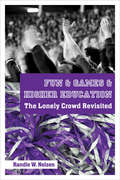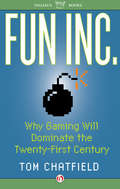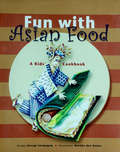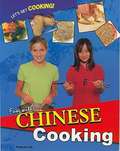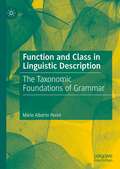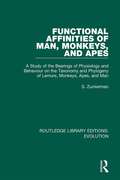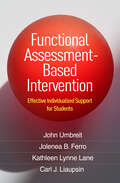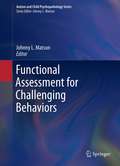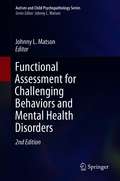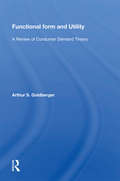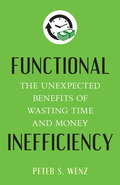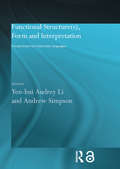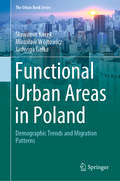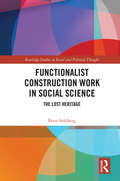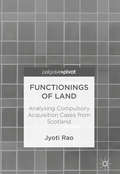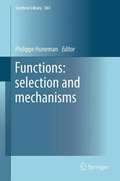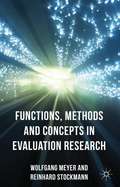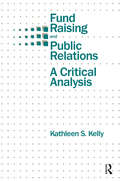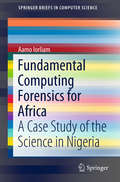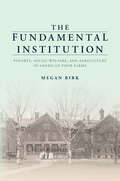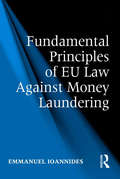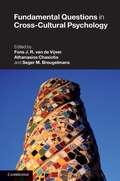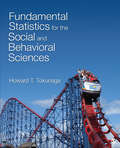- Table View
- List View
Fun & Games & Higher Educatione’: The Lonely Crowd Revisited
by Randle W. NelsenFun & Games & Higher Education ranges from Wayne’s World to hot-rodding, from automobility to the popular phenomenon know as the tailgate party, from German sociologist George Simmel to Canadian Media Guru Marshall McLuhan–all in the interests in exploring North American obsession with play-and particularly the intersection between education, work, and leisure.
Fun Inc.
by Tom Chatfield"An ambitious overview of the videogaming industry, from its beginning to today's immersive online games." --Wall Street Journal
Fun with Asian Food
by Marijke Den Ouden Devagi SanmugamIntroducing Anneke and Max, a lovable brother and sister, who have great fun cooking and eating the favorite dishes of the countries of Asia!Anneke and Max love dressing up in the colorful clothes of each country and readers will also learn about the culture and origin of each food depicted. This book is aimed at children ages 6 -12, but readers of all ages will find much to enjoy. It's also a fun way to introduce children to the delights of cooking, plus an opportunity to learn about the national costumes of each country.This volume is intended to be the first in a series about Anneke and Max 's cooking adventures in Asia.Recipes include:Indian Fruit LassiChicken YakitoriKorean Scallion PancakesChinese Birthday NoodlesThai Chicken SoupVietnamese Spring RollsJapanese Bread SushiIndian Naan PizzaBanana PancakesNo Bake Pineapple TartsMango PuddingChicken Rice BallsJapanese Egg CupsWonton Dumpling Soup
Fun with Chinese cooking (Let’s Get Cooking!)
by Frances LeeThis introduction to Chinese food also highlights the history and dishes that surround the important Chinese holiday Chinese New Year.
Function and Class in Linguistic Description: The Taxonomic Foundations of Grammar
by Mário Alberto PeriniThis book deals with the traditional problem of the classification of linguistic units, with a primary focus on word classes. The approach is descriptive rather than theoretical, and is based on the use of distinctive features analogous to the ones used in phonology, which entails a radical reworking of the traditional classification. The first part presents some basic notions such as the use of distinctive features and the role of word classes in grammar; classification by prototypes; and the use of world knowledge as a resource to assign thematic relations to constituents in the sentence. In the second part, some descriptive problems are examined, namely the classification of verbs according to valency; connectives, adverbs, and the internal constituents of the NP; and the classification of units larger than words. This book will be of use as a guide for linguists working on the description of natural languages, as well as a resource for students on courses in linguistic theory and description.
Functional Affinities of Man, Monkeys, and Apes: A Study of the Bearings of Physiology and Behaviour on the Taxonomy and Phylogeny of Lemurs, Monkeys, Apes, and Man (Routledge Library Editions: Evolution #15)
by S. ZuckermanOriginally published in 1933 Functional Affinities of Man, Monkeys and Apes gives a taxonomic and phylogenetic survey and the findings of diverse experimental investigations of lemurs, monkeys, and apes. The book discusses the inter-relationships of different Primates and emphasizes seldom-used approaches to the question of primate phylogeny. The book attempts to show how little they have been systematically tried, and argues for a regard to the proper place of functional investigations in the study of the classification and evolution of Primates. This book will be of interest to anthropologists, scientists and historians alike.
Functional Assessment-Based Intervention: Effective Individualized Support for Students
by John Umbreit Jolenea B. Ferro Kathleen Lynne Lane Carl J. LiaupsinFrom noted authorities, this book presents a comprehensive approach to designing and implementing evidence-based Tier 3 behavior interventions for K–12 students. The authors' functional assessment-based intervention (FABI) process has been supported by multiple peer-reviewed studies conducted in authentic educational environments. Step by step, chapters spell out proven methods to define target behaviors, determine the function of the undesirable behavior, identify appropriate replacement behaviors, and deliver and monitor intensive interventions. Illustrated with real-world case examples, the book shows how to embed FABI within a school's integrated tiered system of supports. Guidance for scaling FABI district- and statewide is also provided. Ethical issues, professional standards, equity concerns, and cultural and linguistic considerations are addressed throughout. In a convenient large-size format, the book includes reproducible checklists and forms that can also be downloaded for ease of use.
Functional Assessment for Challenging Behaviors
by Johnny L. MatsonAs the cornerstone of applied behavior analysis, functional assessment is supported by a burgeoning literature that focuses on identification of and interventions for aggressive, self-injurious, and other challenging behaviors. Although the number of research studies continues to grow, full-length volumes on using functional assessment to address these behaviors remain few and far between. Comprehensive in coverage, Functional Assessment for Challenging Behaviors expands the knowledge base by providing information on all aspects of its topic. This unique volume addresses basic questions in salient detail, from types and rates of challenging behaviors to populations that warrant functional assessment. In addition, it examines typical assessment techniques, including interview, scaling, experimental, and in vivo methods. The use of functional assessment in treatment planning - and in combination with other interventions - is covered in depth. An especially timely chapter identifies key ethical and legal concerns in working with challenging behavior populations. Coverage includes: The history of behavior analysis and functional assessment.The nature, prevalence, and characteristics of challenging behaviors.Interview and observation methods in functional assessment and analysis.Experimental functional analysis for challenging behaviors.Treatment methods commonly used with functional assessment.Using functional assessment in treatment planning. Functional Assessment for Challenging Behaviors is an essential resource for researchers, scientist-practitioners, and graduate students in clinical child and school psychology, pediatric psychiatry and medicine, social work, rehabilitation, and developmental psychology.
Functional Assessment for Challenging Behaviors and Mental Health Disorders (Autism and Child Psychopathology Series)
by Johnny L. MatsonThis Second Edition updates and expands on the original editorial content and coverage, including new chapters on definitions and rationale, a general overview, research on mental health disorders, report writing, the role of treatment planning, and treatment associated with mental health disorders. The Second Edition builds on the knowledge base by providing the most current information on all aspects of each topic. This unique volume addresses basic questions in salient detail, from types and rates of challenging behaviors to populations that warrant functional assessment. In addition, it examines typical assessment techniques, including interview, scaling, experimental, and in vivo methods. The use of functional assessment in treatment planning – and in combination with other interventions – is covered in depth. Given the vulnerable populations and challenging behaviors (e.g., individuals with autism, intellectual disabilities, mental health issues), the book provides detailed coverage of informed consent as well as legal and ethical issues. Key areas of coverage include:The history of behavior analysis and functional assessment.The nature, prevalence, and characteristics of challenging behaviors.Interview and observation methods in functional assessment and analysis.Experimental functional analysis for challenging behaviors.Treatment methods commonly used with functional assessment.Using functional assessment in treatment planning. Functional Assessment for Challenging Behaviors, Second Edition, is an essential updated resource for researchers, clinicians and other practitioners, and graduate students in clinical child and school psychology, pediatric psychiatry and medicine, social work, rehabilitation, developmental psychology as well as other interrelated disciplines.
Functional Form And Utility: A Review Of Consumer Demand Theory
by Arthur GoldbergerThis book presents a review of classical consumer demand theory, emphasizing the form of utility and demand functions. The theory is developed in general terms with reference to the linear expenditure system and with reference to alternative specifications of complete sets of demand functions.
Functional Inefficiency
by Peter S. WenzHow can we reduce unemployment? As this insightful and counterintuitive book shows, the surprising answer is inefficiency. Some of the most labor-intensive sectors of the economy, the author notes, are also the most inefficient. But this inefficiency is functional--rather than impairing the economy, it bolsters employment and fosters economic growth.Technological progress increases efficiency and reduces the need for workers in manufacturing, mining, agriculture, and many services. So how do we keep people working? By maintaining inefficiencies in other areas, such as in our systems of transportation and healthcare. The author documents the waste of time and money in hospital systems, the insurance and pharmaceutical industries, automotive travel, and road construction and maintenance. These inefficiencies are tolerated because they provide a lot of jobs and promote economic growth, making them functional inefficiencies.Some of these inefficient systems come with added environmental and health costs, meaning we sacrifice more than simple efficiency for the sake of jobs. Our inefficiencies may be functional, argues Peter Wenz, but they are too often harmful for us as well.The good news is that most of these inefficiencies can be reduced without increasing unemployment or impairing economic growth. Wenz explores different methods of combating unemployment, evaluating each method carefully to determine its basic efficiencies and inefficiencies, as well as its impact on human wellbeing and on the environment. He also assesses whether it is culturally and politically acceptable and actually serves to reduce unemployment. Some inefficiency will remain, he concludes, but its negative impacts can be lessened through increased investment in physical and human infrastructure.Functional Inefficiency offers a wealth of details and a unique analysis of our economic system, plus hope for our future prospects through reduced inefficiency.From the Hardcover edition.
Functional Structure: Perspectives from East Asian Languages (Routledge Studies in Asian Linguistics)
by Yen-hui Audrey Li Andrew SimpsonThe issue of how interpretation results from the form and type of syntactic structures present in language is one which is central and hotly debated in both theoretical and descriptive linguistics.This volume brings together a series of eleven new cutting-edge essays by leading experts in East Asian languages which shows how the study of formal structures and functional morphemes in Chinese, Japanese and Korean adds much to our general understanding of the close connections between form and interpretation. This specially commissioned collection will be of interest to linguists of all backgrounds working in the general area of syntax and language change, as well as those with a special interest in Chinese, Japanese and Korean.
Functional Urban Areas in Poland: Demographic Trends and Migration Patterns (The Urban Book Series)
by Sławomir Kurek Mirosław Wójtowicz Jadwiga GałkaThis book explores demographic changes in Functional Urban Areas (FUAs) in Poland since 1990. Functional Urban Areas, introduced by ESPON, refer to functional territorial units that can be defined as travel-to-work-area, representing strong integration between urban cores and their immediate hinterland. The functional urban area consists of a city plus its commuting zone. It fills a significant gap in the academic literature by providing a deep and thorough analysis of the process of population change in Polish FUAs over the past 30 years. In particular, this empirical research work addresses population growth and decline; the main components of population growth including fertility, mortality and migration; age composition; and the pace of population ageing. The book argues that the transformations of urban structures are triggered by second demographic transition (SDT) and suburbanization processes. Based on data from the Central Statistical Office, this comparative study on FUAs in Poland, which employs a division into core and commuting zones, reveals essential similarities and differences in population development, making it possible to construct a demographic typology of FUAs and investigate their spatial arrangements. A unique and innovative book, it will appeal to geographers, demographers, urbanists, city planners and policymakers, as well as students, academic researchers and others involved in urban studies.
Functionalist Construction Work in Social Science: The Lost Heritage (Routledge Studies in Social and Political Thought)
by Peter SohlbergAn understanding of the complex consequences of social processes and social design activities necessitates a holistic systemic perspective, systematised in the classic structural-functional research tradition, which is presented in Functionalist Construction Work in Social Science. In contrast to fragmented discussions of functionalism and functional analyses, the approach here covers a span ranging from ontological, epistemological and primarily methodological aspects of functionalism. The functionalist tradition in social science is placed in a historic context, and problematised from a philosophy of science perspective. Unique here is a detailed account of four classic functionalist research programmes with a discussion of functionalism, not primarily as a worldview, but as systematic knowledge-generating research strategies. In addition to descriptive and causal questions, the importance of a further research question is demonstrated, i.e., the identification of crucial problems of social organisation. Functionalist research strategies and functional analysis are of interest for social scientists and students in sociology, political science, and social anthropology. Moreover, the book is relevant for researchers and students of philosophy of science and social science methodology
Functionings of Land: Analysing Compulsory Acquisition Cases from Scotland
by Jyoti RaoThis book focuses on the 'functionings' and capabilities generated from land by their owners and the challenge in satisfactorily recreating these through the compensation paid in the case of compulsory acquisition of private land. These discussions initiate a new debate on the insufficiency of existing approaches to compensation that are ignorant of the losses of ‘capabilities’ and ‘functionings’. The relationship between land, ownership and well-being of an individual is explained through the identification of various ‘functionings’ associated with the ownership of land in the context of Scotland. Contemporary approaches to compensation, founded on the utilitarian argument, have led to dissatisfactory outcomes for the affected landowners. Discussions in this book shift the focus to equalizing the share of burdens and benefits for each individual member of the society, through equalization of human capabilities. This book will be of value to development economists, researchers, policy makers and law makers concerned with compulsory acquisition of land.
Functions: selection and mechanisms
by Philippe HunemanThis volume handles in various perspectives the concept of function and the nature of functional explanations, topics much discussed since two major and conflicting accounts have been raised by Larry Wright and Robert Cummins' papers in the 1970s. Here, both Wright's 'etiological theory of functions' and Cummins' 'systemic' conception of functions are refined and elaborated in the light of current scientific practice, with papers showing how the 'etiological' theory faces several objections and may in reply be revisited, while its counterpart became ever more sophisticated, as researchers discovered fresh applications for it. Relying on a firm knowledge of the original positions and debates, this volume presents cutting-edge research evincing the complexities that today pertain in function theory in various sciences. Alongside original papers from authors central to the controversy, work by emerging researchers taking novel perspectives will add to the potential avenues to be followed in the future. Not only does the book adopt no a priori assumptions about the scope of functional explanations, it also incorporates material from several very different scientific domains, e.g. neurosciences, ecology, or technology. In general, functions are implemented in mechanisms; and functional explanations in biology have often an essential relation with natural selection. These two basic claims set the stage for this book's coverage of investigations concerning both 'functional' explanations, and the 'metaphysics' of functions. It casts new light on these claims, by testing them through their confrontation with scientific developments in biology, psychology, and recent developments concerning the metaphysics of realization. Rather than debating a single theory of functions, this book presents the richness of philosophical issues raised by functional discourse throughout the various sciences.
Functions, Methods And Concepts In Evaluation Research
by Reinhard Stockmann Wolfgang Meyer Gareth BartleyBy explaining the role of evaluation in modern societies and its historical development in the USA and Europe this book highlights the scientific roots of Evaluation and offers an overview of its fundamental theories and concepts. The process of collecting, analyzing and interpreting is explored giving an insight into the course of an evaluation.
Functions: selection and mechanisms (Synthese Library #363)
by Philippe HunemanThis volume handles in various perspectives the concept of function and the nature of functional explanations, topics much discussed since two major and conflicting accounts have been raised by Larry Wright and Robert Cummins’ papers in the 1970s. Here, both Wright’s ‘etiological theory of functions’ and Cummins’ ‘systemic’ conception of functions are refined and elaborated in the light of current scientific practice, with papers showing how the ‘etiological’ theory faces several objections and may in reply be revisited, while its counterpart became ever more sophisticated, as researchers discovered fresh applications for it. Relying on a firm knowledge of the original positions and debates, this volume presents cutting-edge research evincing the complexities that today pertain in function theory in various sciences. Alongside original papers from authors central to the controversy, work by emerging researchers taking novel perspectives will add to the potential avenues to be followed in the future. Not only does the book adopt no a priori assumptions about the scope of functional explanations, it also incorporates material from several very different scientific domains, e.g. neurosciences, ecology, or technology. In general, functions are implemented in mechanisms; and functional explanations in biology have often an essential relation with natural selection. These two basic claims set the stage for this book’s coverage of investigations concerning both ‘functional’ explanations, and the ‘metaphysics’ of functions. It casts new light on these claims, by testing them through their confrontation with scientific developments in biology, psychology, and recent developments concerning the metaphysics of realization. Rather than debating a single theory of functions, this book presents the richness of philosophical issues raised by functional discourse throughout the various sciences.
Fund Raising and Public Relations: A Critical Analysis (Routledge Communication Ser.)
by Kathleen S. KellyThis is the first scholarly work to place the function of fund raising within the field of public relations, redefining it as a specialization responsible for the management of communication between a charitable organization and its donor publics. Combining her academic interest in communication with her experience as a fund raiser, the author has produced one of the few critical studies on fund raising, challenging current perspectives and employing systems theory and the concept of organizational autonomy to lead to a new and different approach. Until now, fund raising has been an anomaly, without an academic home and with few general theories to guide practitioner behavior. This book theoretically grounds fund raising and develops a theory that provides a fuller understanding of one of the fastest growing occupations in the nonprofit sector.
Fundamental Computing Forensics for Africa: A Case Study of the Science in Nigeria (SpringerBriefs in Computer Science)
by Aamo IorliamThis book presents a general introduction to the computational aspects of forensic science, covering the different tools needed for forensic investigations, the importance of forensics and biometrics, and the use of Benford’s law for biometrics and network traffic analysis. It specifically focuses on the application of these techniques in Africa, and how they can be of benefit in the investigation of crime in Nigeria in particular.
The Fundamental Institution: Poverty, Social Welfare, and Agriculture in American Poor Farms
by Megan BirkBy the early 1900s, the poor farm had become a ubiquitous part of America's social welfare system. Megan Birk's history of this foundational but forgotten institution focuses on the connection between agriculture, provisions for the disadvantaged, and the daily realities of life at poor farms. Conceived as an inexpensive way to provide care for the indigent, poor farms in fact attracted wards that ranged from abused wives and the elderly to orphans, the disabled, and disaster victims. Most people arrived unable rather than unwilling to work, some because of physical problems, others due to a lack of skills or because a changing labor market had left them behind. Birk blends the personal stories of participants with institutional histories to reveal a loose-knit system that provided a measure of care to everyone without an overarching philosophy of reform or rehabilitation. In-depth and innovative, The Fundamental Institution offers an overdue portrait of rural social welfare in the United States.
Fundamental Principles of EU Law Against Money Laundering
by Emmanuel IoannidesThis book critically analyses fundamental principles of EU law for the control of international economic crime. Discussing how the reporting system and the exchange of information are at the heart of the global anti-money laundering regime, the study also looks at the inferential force of financial intelligence in criminal proceedings and the responsibilities this places on prosecutors and criminals alike. The author closely examines the application of Article 8(2) of the European Court of Human Rights for the retention and movement of the fingerprints, cellular samples and DNA profiles of unconvicted persons, and argues the incompatibility with the ECHR, along with the effect of socially stigmatising unconvicted persons. The work concludes with exploring how financial regulation has, inter alia, shifted responsibility to businesses and financial institutions to become more transparent and accountable to financial regulators and tax authorities. This critical analysis is essential reading for law students and the Judicial Body, as well as financial crime investigators and regulators.
Fundamental Questions in Cross-Cultural Psychology
by Seger M. Breugelmans Fons J. van de Vijver Athanasios ChasiotisCross-cultural psychology has come of age as a scientific discipline, but how has it developed? The field has moved from exploratory studies, in which researchers were mainly interested in finding differences in psychological functioning without any clear expectation, to detailed hypothesis tests of theories of cross-cultural differences. This book takes stock of the large number of empirical studies conducted over the last decades to evaluate the current state of the field. Specialists from various domains provide an overview of their area, linking it to the fundamental questions of cross-cultural psychology such as how individuals and their cultures are linked, how the link evolves during development, and what the methodological challenges of the field are. This book will appeal to academic researchers and post-graduates interested in cross-cultural research.
Fundamental Statistics for the Social and Behavioral Sciences: Tokunaga: Fundamental Statistics For The Social And Behavioral Sciences + Sage Ibm® Spss® Statistics V23. 0 Student Version
by Howard T. TokunagaThis thematically-based textbook places statistics within the research process, illustrating how statistics are used to answer questions and test ideas. Students learn not only how to calculate statistics, but also how to interpret the results of statistical analyses in light of a study’s research hypothesis and to communicate their results and interpretations to a broader audience. Featuring accessible writing and well-integrated research examples, Fundamental Statistics for the Social and Behavioral Sciences by Howard T. Tokunaga is designed to help readers develop an appreciation of how statistics are applied to topics and questions of interest, gain an appreciation of issues related to the use of statistics, and enhance their understanding of the research process and the role of statistics within it.
Fundamental Statistics for the Social and Behavioral Sciences: Tokunaga: Fundamental Statistics For The Social And Behavioral Sciences + Sage Ibm® Spss® Statistics V23. 0 Student Version
by Howard T. TokunagaThis thematically-based textbook places statistics within the research process, illustrating how statistics are used to answer questions and test ideas. Students learn not only how to calculate statistics, but also how to interpret the results of statistical analyses in light of a study’s research hypothesis and to communicate their results and interpretations to a broader audience. Featuring accessible writing and well-integrated research examples, Fundamental Statistics for the Social and Behavioral Sciences by Howard T. Tokunaga is designed to help readers develop an appreciation of how statistics are applied to topics and questions of interest, gain an appreciation of issues related to the use of statistics, and enhance their understanding of the research process and the role of statistics within it.
